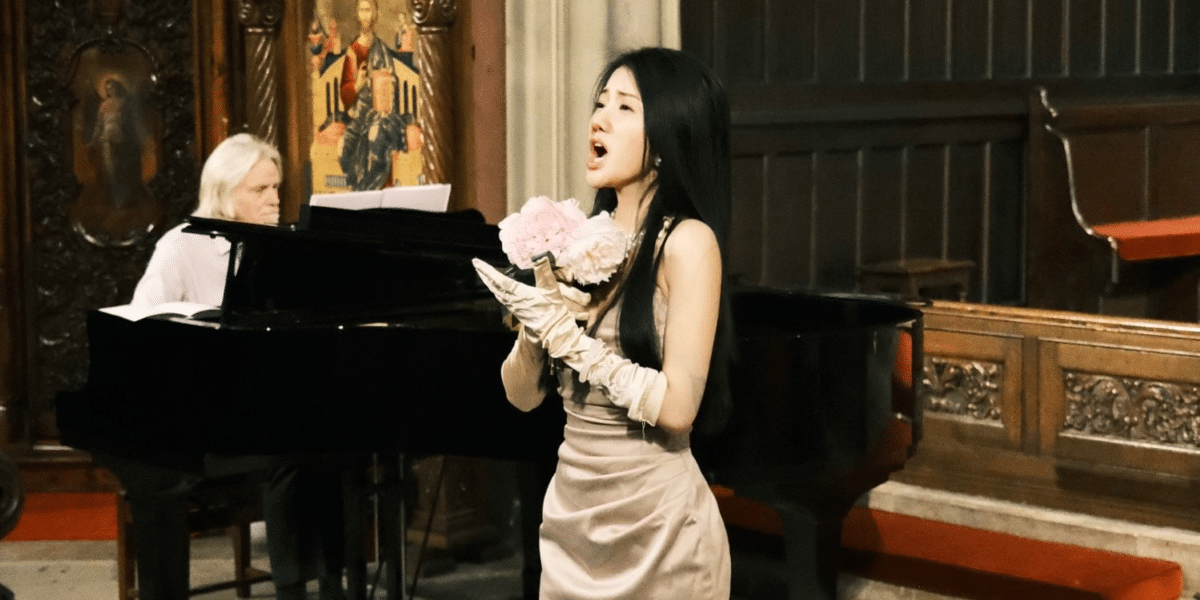By: Anne Schulze
From Steinway Hall in Changsha, China, to Sheffield Cathedral and historic churches in central London, soprano Shengzhao Jiang has been involved in public classical concerts as a student since 2017. Following her post-graduate studies, she founded the Silk Concert Series, an innovative interpretation of classical repertoire blending the East and the West, to promote cross-cultural exchange through music and explore new energies of classical music.
Inspired by her studies of music performance in China and traditional British education, she always wants to bring to Western audiences the Oriental music with its deep history and unique tunes. She also noticed that music in the cultural collision is burst with a stronger ethnic characteristic.
The Silk Concert, named after the Silk Road – where the earliest music and cultural transmission from the East to the West was accomplished, has taken its roots in London. Collaborating with local and internationally acclaimed musicians and supported by the Chinse Embassy in the UK and Chinese mainstream media, the concert features a range of blended Chinese and Western repertoire, including Shengzhao’s adaptations, via thousands of years old traditional Chinese instruments, including guzheng, pipa, erhu and bamboo flute.

Beginning in 2022, Shengzhao’s concerts took place in historic venues in central London, including St. James Church, St. Dunstan-in-the-West, and the Westminster Music Library. These concerts include ticket-free charity concerts, with repertoire consisting of Chinese art songs and arias, instrumental ensembles, popular music, well-known film & TV music, as well as traditional Chinese dances. This has always led to thunderous applause from the full-house audience for the innovation and high quality of the concerts.
Shengzhao’s adaptation adds a distinctive element to the concert: she combines Western and Chinese classical singing techniques: the round, chesty bel canto with the thin, head-strong Chinese folk singing method, to match the Chinese diction and the reverberation from the church’s vaulted ceilings.
Guzheng, a 2,000-year-old Chinese instrument with a mellow sound and a lingering rhythm, took part in her adapted ‘Cooing and Wooing’ by using vibrato at the prelude and ending to imitate the xiao sound, creating a scene of a fresh breeze on a riverbank in an ancient landscape. In the adaptations of Orchid Pavilion Preface and Fly Me to the Moon, pipa can be used to mimic Chinese opera singing with its push-pull string technique, as well as vibrato in jazz music to work with piano and vocals. In addition, the erhu and bamboo flute, these ancient oriental instruments, are given a contemporary twist in Shengzhao’s adaptations to partner with Western instruments.
St Dunstan-in-the-West Dunstan’s Church in central London is a historic church over a thousand years old, where Handel and John Reading were invited to play the organ. It escaped the 1666 London Great Fire and was the first public clock with a minute hand in London. By looking up, you can often see sunlight pouring through the Victorian stained glass—it is in this context that Shengzhao’s music resonates under the octagonal vaulted ceiling.
Daniel Fenhane, a London-based Bachelor of Fine Arts, said, “This is a sound that comes from the clouds, and I was baptized in the ancient tones of this old building.” This is also the reason why Shengzhao chose the church as the concert venue. The natural echo from the church’s dome structure is like a giant acoustic, where the audience would get an immersive cultural and artistic experience.
“Regardless of the purpose, whether it’s an in-depth appreciation of classical music or simply wanting to relax in a space while listening to something, we very much encourage audience participation,” said Shengzhao, “To generate interest or deep reverie, that’s what our performances are about, to allow people a new way of experiencing classical music, and to bring the audience’s attention to cultural traditions and historical development, contributing to the transmission and development of culture.”

Shengzhao loves to create stages for young musicians, “As a music performance professional, I can understand how much musicians need the stage, which is why I invited a lot of local students and musicians; I encourage everyone to bring their ethnic characteristics to the stage, through the mutual inspiration of performers from different backgrounds and to present diversified works, to promote understanding and appreciation of multiculturalism,” she said. “That is what this city – London, offers you; there are always like-minded others and new opportunities that motivate you to pursue what you desire to do.”
Shengzhao’s upcoming plans include continuing The Silk Concert series and collaborating with local artists and students from the Royal Academy of Music; Shengzhao will be attending music festivals and continuing to work with London Nine Songs Limited as one of the tutors and concert organizers on the UK Study Tour and Art Festival Program, which will provide more Asian students with an in-depth experience of Western education and lifestyles, building bridges for the next generation with musical talent.
Shengzhao shows unprecedented motivation and intends to invite musicians from worldwide backgrounds to perform their ethnic music in the future “because music is our language when we don’t speak the same one.” She also called on musicians to apply innovations while preserving the essence of classical music to breathe fresh vibes into it.

Published by: Nelly Chavez


















